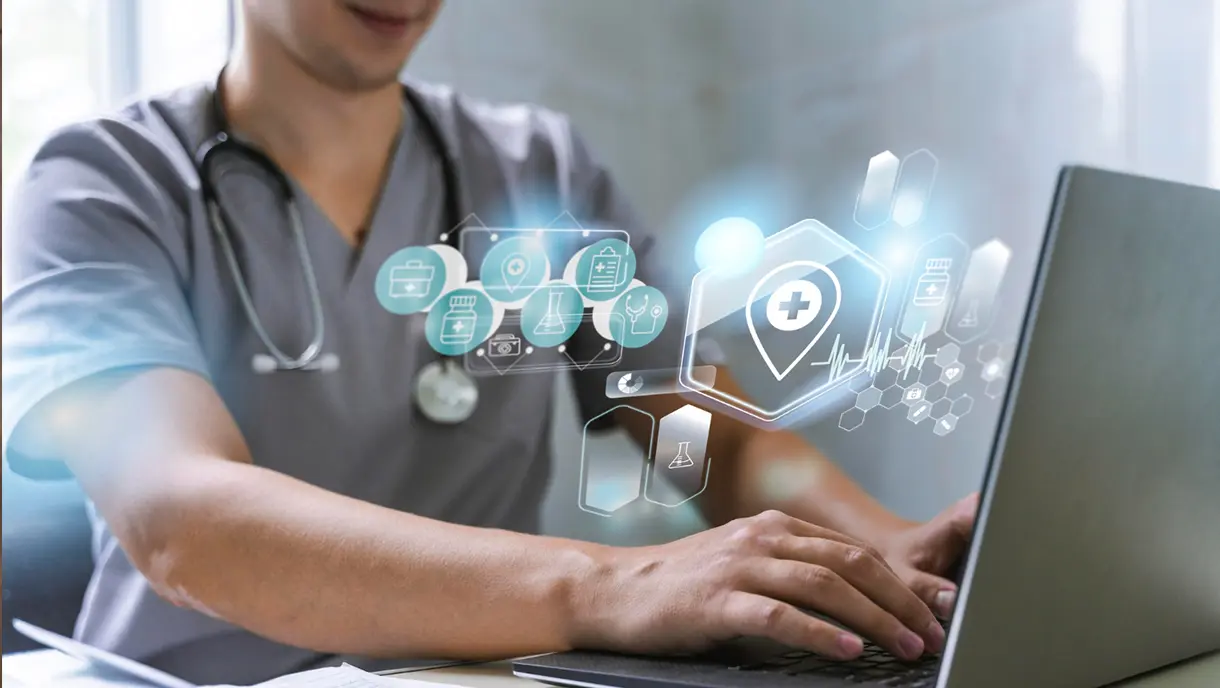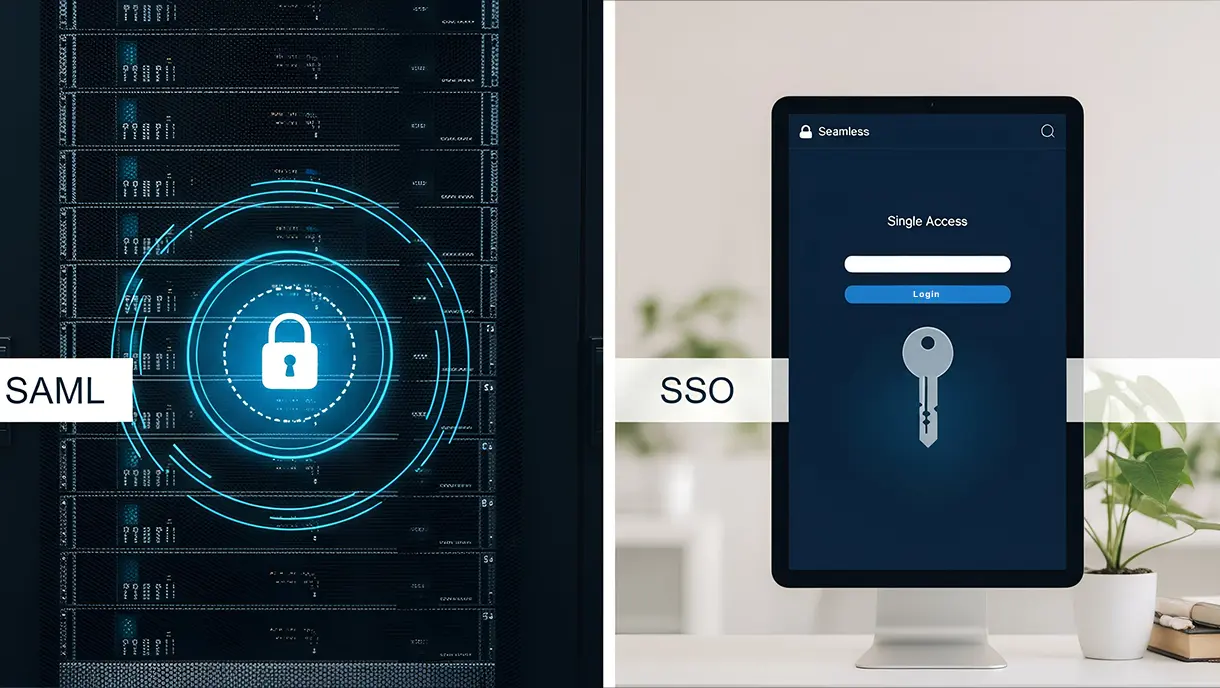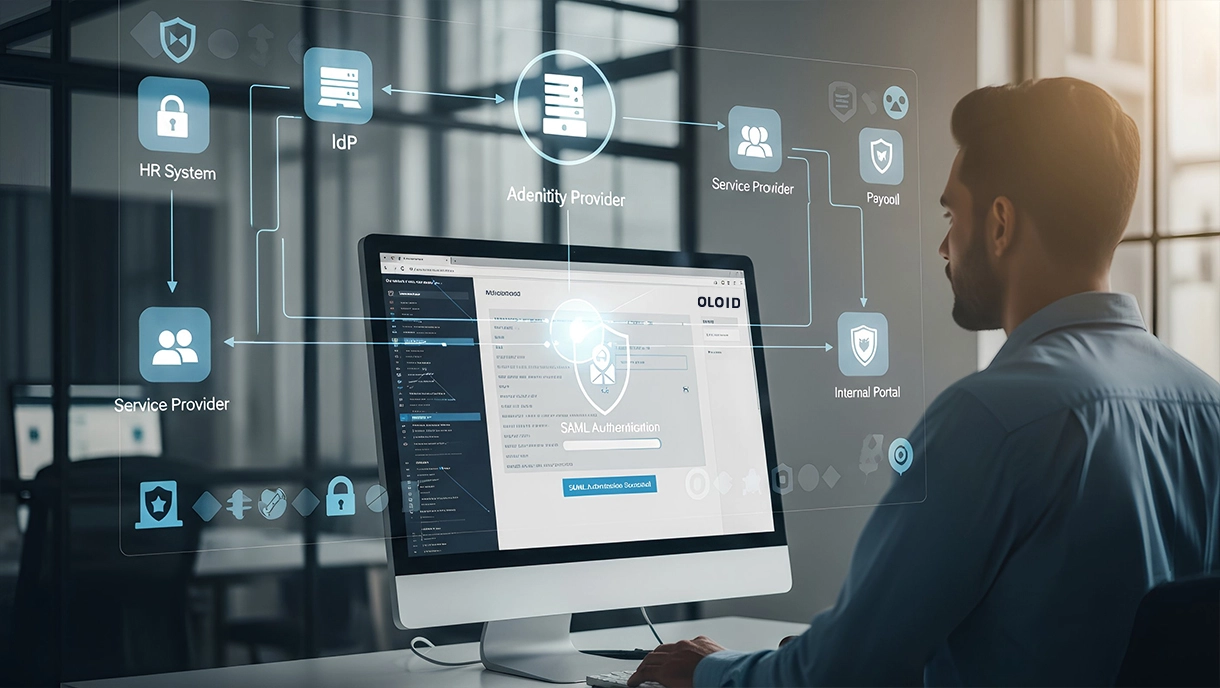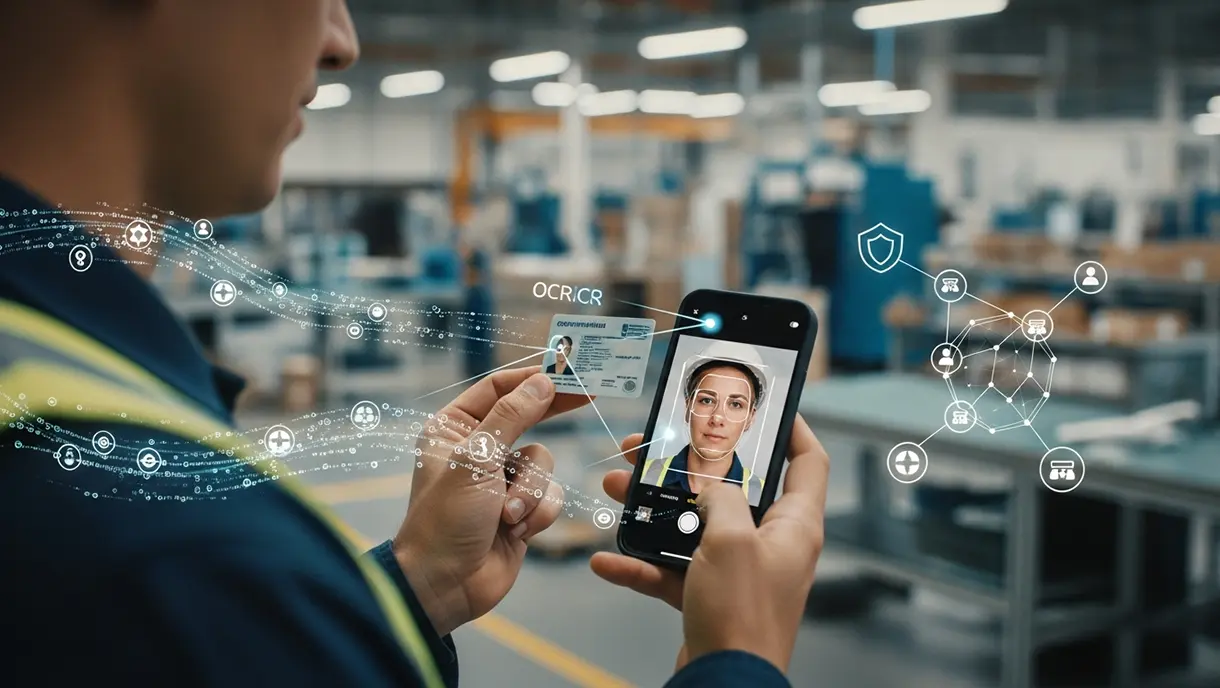The Complete Guide to Healthcare Access Management
Healthcare access management protects patient data while ensuring clinical staff can access critical systems instantly. This guide explores how identity and access controls secure sensitive health information against breaches and insider threats. Learn about the core components that make access management work, from authentication methods to audit trails.

Healthcare organizations are under growing pressure to balance data security, compliance, and operational efficiency. With thousands of employees, contractors, and clinicians accessing sensitive systems daily, from electronic health records (EHRs) to connected medical devices, one question stands out:
How can we make access simple for staff while keeping patient data completely secure?
According to the HIPAA Journal, healthcare data breaches affected over 133 million patients in 2024 alone, exposing the growing vulnerabilities within traditional access systems. For IT and security leaders, protecting patient information is no longer just about compliance. It’s about preserving trust and ensuring uninterrupted care.
That’s where healthcare access management comes in. It provides a structured way to control who can access which systems and data, under what conditions, and for how long. Modern access management solutions are now helping hospitals and clinics achieve that balance by replacing passwords with identity-based, automated, and passwordless access models.
In this blog, we’ll explore what healthcare access management really means and why it’s uniquely important for the healthcare industry. Explore components, implementation benefits, adoption challenges, and best practices to integrate access management in your healthcare organization. Let’s get started.
What Is Healthcare Access Management?
Healthcare access management refers to the processes and technologies that control who can access patient data, medical systems, and physical facilities within a healthcare organization. It ensures that only authorized individuals, such as doctors, nurses, or administrators, can view or interact with sensitive information, protecting both patient privacy and organizational security.
In simpler terms, it’s the framework that decides “who gets access to what, when, and how” across digital and physical healthcare environments. From logging into an electronic health record (EHR) system to entering a restricted lab area, access management safeguards every interaction that involves sensitive data or systems.
Unlike traditional IT access systems, healthcare access management is built around compliance-heavy, high-stakes environments. It must support a wide range of roles, temporary staff, and real-time workflows, all without slowing down patient care.
At its core, healthcare access management combines:
- Identity verification: Ensuring every user is who they claim to be
- Authorization controls: Granting access based on role, location, or time of day
- Continuous monitoring: Tracking and auditing access for security and compliance
- Automation: Managing onboarding and offboarding efficiently to reduce risks
Together, these elements help healthcare organizations maintain HIPAA compliance, reduce insider threats, and simplify secure access for both clinical and non-clinical staff.
Key Objectives of Access Management in Healthcare
Healthcare access management serves multiple critical objectives that protect both patients and organizations.
1. Safeguarding Patient Data (PHI)
Protected Health Information (PHI) is among the most sensitive data types across industries. Access management creates barriers that prevent unauthorized viewing, modification, or theft of patient records. It ensures that only authorized personnel can access medical histories, test results, and treatment plans. Strong access controls minimize the risk of data breaches and identity theft.
2. Enforcing Compliance (HIPAA, HITECH, GDPR)
Healthcare organizations must comply with numerous regulations governing the protection of patient data. HIPAA requires strict controls over who can access PHI and detailed audit trails. HITECH strengthens these requirements and mandates breach notification procedures. Access management systems provide the technical controls needed to demonstrate compliance during audits.
3. Streamlining Staff Access and Reducing Login Friction
Healthcare professionals often need to access multiple systems throughout their shifts. Password fatigue and complex login procedures can slow down critical care delivery. Modern access management solutions reduce these barriers through single sign-on and biometric authentication. The result is faster access to information when every second counts.
4. Ensuring Accountability Through Traceable Access
Every access event should be logged and attributable to a specific individual. This traceability deters unauthorized access and supports forensic investigations after security incidents. Audit logs also help organizations identify unusual access patterns that may indicate compromised credentials. Clear accountability promotes responsible data handling across the organization.
These objectives clarify the need for effective access management in healthcare. Next, let’s also discuss why the healthcare industry needs specialized access management measures that don’t fit in other sectors.
Why the Healthcare Industry Needs Specialized Access Management
The healthcare sector faces unique access management challenges that generic solutions cannot adequately address. Let’s explore a few common reasons why the healthcare industry needs specialized access management.
1. High Stakes of Data Breaches and Insider Threats
Healthcare data commands premium prices on the dark web because of its comprehensive nature. A single health record contains insurance details, social security numbers, medical histories, and financial information. Cybercriminals can use this data for insurance fraud, identity theft, and blackmail. The value of healthcare data makes medical organizations prime targets for sophisticated attacks.
Key Concerns Include
- Insider threats from employees misusing legitimate access privileges.
- Credential theft through phishing and social engineering attacks.
- Third-party vendor breaches that compromise connected systems.
- Legacy systems with inadequate security controls.
2. Complex Access Requirements
Healthcare environments involve diverse user groups with varying access needs. Doctors require broad access to patient records across departments for comprehensive care decisions. Nurses need real-time access to medication administration records and care plans during their shifts. Administrative staff access billing systems and scheduling tools without needing clinical information.
Additional Complexity Factors
- Temporary staff and contractors requiring limited-time access.
- Remote workers accessing systems from various locations and devices.
- Emergency scenarios requiring immediate access overrides.
- Shift-based access that changes based on current duty assignments.
3. Compliance Pressure
Healthcare faces one of the most stringent regulatory environments of any industry. HIPAA establishes minimum standards for protecting patient privacy and security. HITECH extends these requirements and increases penalties for non-compliance. State laws and international regulations, like GDPR, add layers of complexity.
How Access Management Supports Compliance
- Automated enforcement of minimum necessary access principles.
- Comprehensive audit logs that document all access events.
- Regular access reviews to identify and remove inappropriate permissions.
- Real-time alerts for suspicious access patterns or policy violations.
These points highlight why it is important for healthcare organizations to implement effective access control to remain compliant and yet efficient. Next, let’s explore what an effective access management framework looks like in the healthcare industry.
[[cta]]
4 Core Components of Effective Healthcare Access Management
Building a robust access management framework requires integrating several fundamental components that work together seamlessly. Each component addresses specific aspects of identity and access control. Understanding these core elements helps organizations design and implement effective access strategies.
1. Identity Lifecycle Management
Identity lifecycle management governs how user accounts are created, modified, and eventually removed. Onboarding processes establish initial access for new employees upon joining the healthcare organization. These processes assign appropriate permissions based on job roles and responsibilities. Automated provisioning ensures new staff can access necessary systems from day one.
2. Authentication and Authorization
Authentication verifies that users are who they claim to be before granting access. Traditional password-based authentication creates security and usability challenges in healthcare settings. Passwordless options like biometrics and hardware tokens offer stronger security while improving the user experience. Multi-factor authentication (MFA) adds an extra layer of verification to sensitive systems.
3. Single Sign-On (SSO)
Healthcare professionals typically use 10 to 20 different systems during a single shift. Logging into each system separately wastes valuable time and creates password fatigue. SSO in the healthcare industry allows users to authenticate once and access all authorized applications. This streamlined approach dramatically improves efficiency and reduces login-related frustration.
4. Access Governance and Auditing
Access governance ensures that permissions remain appropriate as roles and responsibilities evolve. Periodic access reviews identify users with excessive or outdated permissions. These reviews help organizations maintain compliance with regulatory requirements. Automated tools can flag suspicious permission patterns for investigation.
A combination of these components ensures fail-proof access management in healthcare. However, what are the benefits of implementing access management in healthcare? Let’s find out.
[[cta-2]]
Proven Benefits of Access Management in Healthcare
Implementing comprehensive access management delivers measurable benefits across security, operations, and compliance. Modern healthcare access management solutions provide far-reaching benefits beyond basic security. Here are the key benefits of effective access management for healthcare organizations:
1. Enhances Security and Compliance
Access management serves as the foundation for protecting patient data from unauthorized access. By controlling who can view and modify PHI, organizations dramatically reduce the risk of breaches. Automated enforcement of security policies eliminates gaps created by manual processes. Real-time monitoring detects suspicious activities before they escalate into full breaches.
By implementing a healthcare passwordless authentication platform, compliance becomes more manageable. Audit trails automatically document access events required for HIPAA compliance. Access reviews ensure that permissions align with the minimum necessary standard. Organizations can quickly respond to audit requests with comprehensive access reports.
2. Improves Staff Productivity and Experience
Healthcare professionals spend less time on authentication and more time on patient care. Single sign-on eliminates the need to remember multiple passwords for different systems. Biometric authentication allows quick access without fumbling for credentials during emergencies. Fewer password resets mean less time wasted waiting for IT support.
Streamlined access also reduces frustration and improves job satisfaction among clinical staff. When systems work seamlessly, healthcare workers can focus on their primary mission. Reduced friction in daily workflows leads to better morale and lower burnout rates. Satisfied employees provide better patient care and are more likely to stay with the organization.
3. Gives Better Visibility and Control
Centralized access management provides a single source of truth for user identities and permissions. Administrators can view all access rights from one dashboard rather than checking multiple systems. This visibility makes it easier to identify security gaps and permission inconsistencies. Organizations gain unprecedented insight into who has access to what resources.
Enhanced visibility also supports better decision-making about access policies and controls. Security teams can analyze access patterns to optimize security without hindering workflows. Executive dashboards provide high-level views of security posture for board reporting. Clear visibility enables proactive security management rather than reactive incident response.
4. Reduces IT Overhead
Automated provisioning and deprovisioning eliminate time-consuming manual account management tasks. HR system integration triggers access changes automatically based on employment status. IT staff spend less time on routine password resets and access requests. Resources freed from these administrative tasks can focus on strategic initiatives.
Compliance reporting becomes dramatically simpler with automated audit log collection and analysis. Rather than manually compiling access data for audits, systems generate required reports automatically. This automation reduces the staff time and costs associated with compliance activities. Organizations can demonstrate compliance more efficiently and with greater confidence.
These benefits clearly highlight why more and more healthcare organizations are focusing on access management. However, implementing access management comes with its own challenges and roadblocks.
Challenges in Implementing Healthcare Access Management
Healthcare organizations operate in complex, heterogeneous technology environments that resist simple solutions. Legacy systems, diverse user populations, and mission-critical workflows create unique implementation challenges. Understanding these obstacles helps organizations plan more realistic deployments.
1. Integration with Legacy Systems
Problem Statement
Many healthcare organizations rely on decades-old systems that lack modern security features. These legacy applications may not support modern authentication methods such as SSO or MFA. Custom integration is often required to migrate legacy systems into modern access management frameworks. The cost and complexity of these integrations can be prohibitive for resource-constrained organizations.
How to Overcome Integration Challenges
- Conduct a thorough inventory of all systems and their authentication capabilities.
- Prioritize integration efforts based on system criticality and data sensitivity.
- Use federation protocols and authentication proxies for legacy system compatibility.
- Consider a phased implementation that tackles the easiest integrations first.
- Engage vendors who specialize in healthcare system integration.
- Budget adequate time and resources for custom integration development.
2. Balancing Security and Usability
Problem Statement
Overly restrictive access controls can impede urgent patient care in emergencies. Healthcare workers may resist security measures they perceive as obstacles to their clinical duties. Finding the right balance between protection and accessibility requires a deep understanding of clinical workflows. Security measures that work well in other industries may prove impractical in healthcare settings.
How to Overcome Usability Challenges
- Involve clinical staff early in planning to understand workflow requirements.
- Implement context-aware authentication that adapts to clinical scenarios.
- Provide emergency access procedures with appropriate audit and review processes.
- Use biometric technologies, such as facial and RFID authentication, for fast access without compromising security.
- Conduct usability testing with actual end users before full deployment.
- Continuously gather feedback and refine access policies based on real-world usage.
3. Managing Access for Third-Party Contractors or Remote Staff
Problem Statement
Healthcare organizations increasingly rely on contractors, vendors, and remote workers. These external users need temporary or limited access to specific systems and data. Managing these non-employee identities adds complexity to access management programs. Without proper controls, third-party access creates significant security vulnerabilities.
How to Overcome Third-Party Access Challenges
- Establish clear policies for requesting and approving external user access.
- Implement automated expiration dates for temporary access grants.
- Use separate authentication systems for external users when possible.
- Require stronger authentication for remote access scenarios.
- Conduct regular reviews of all external user accounts and permissions.
- Monitor third-party access patterns for anomalous behavior.
4. Ensuring Real-Time Access in Critical Environments (like ERs)
Problem Statement
Emergency departments and intensive care units operate 24/7 with unpredictable patient loads. Healthcare workers need immediate access to systems during life-threatening situations. Any authentication delay could literally mean the difference between life and death. Access management solutions must account for these high-pressure, time-sensitive scenarios.
How to Overcome Critical Environment Challenges
- Design emergency access procedures that maintain both speed and accountability.
- Use biometric authentication methods that work in seconds, not minutes.
- Implement break-glass access for true emergencies with post-access review.
- Deploy shared workstations with fast user switching capabilities.
- Test access systems under realistic high-stress conditions.
- Create escalation procedures for authentication system failures.
While these challenges can make access management seem complex, the right strategy can simplify implementation and strengthen security across every level of healthcare operations. Let’s look at some best practices to make that possible.
[[cta-3]]
Best Practices for Strengthening Healthcare Access Management
Successful healthcare access management requires more than just deploying technology solutions. Organizations must adopt strategic approaches and operational practices that reinforce security objectives.
1. Adopt Zero Trust Architecture
Zero trust assumes that threats can come from anywhere, including inside the network perimeter. This approach requires continuous verification of all users and devices attempting to access resources. Rather than trusting users simply because they're on the corporate network, zero trust validates every access request. This architecture significantly reduces the impact of compromised credentials or insider threats.
2. Implement Least Privilege and Context-Based Access
Users should receive only the minimum permissions necessary to perform their job functions. This principle limits the potential damage from compromised accounts or malicious insiders. Context-based access adapts permissions based on factors like location, time, and device security posture. Someone accessing records from an unsecured device might face additional restrictions compared to accessing from a secured workstation.
3. Use Automated Provisioning and Real-Time Monitoring
Manual account management creates delays and increases the risk of human error. Automated provisioning ensures new employees receive appropriate access on their first day. Real-time monitoring detects suspicious access patterns as they occur, not days later. Automation also ensures the consistent application of security policies across all systems.
4. Conduct Regular Access Audits and Compliance Reviews
Periodic reviews identify permission creep where users accumulate unnecessary access over time. These audits also catch former employees who still have active accounts. Regular compliance reviews ensure that access controls continue to meet regulatory requirements. Quarterly reviews represent a good baseline, with more frequent checks for high-privilege accounts.
5. Educate Staff on Access Hygiene and Data Privacy
Technology alone cannot protect patient data without informed, security-conscious users. Regular training helps staff understand why access controls matter and how to use them properly.
Training should cover topics like recognizing phishing attempts, creating strong passwords, and protecting credentials. Security awareness programs turn staff from potential vulnerabilities into active defenders of patient privacy.
Enables Secure and Seamless Healthcare Access with OLOID
In today’s connected healthcare ecosystem, effective access management is no longer optional; it’s foundational. By controlling who can access patient data, systems, and facilities, healthcare organizations can strengthen data security, ensure HIPAA compliance, and maintain the trust that patients place in them.
OLOID helps healthcare organizations embrace this transformation. With its unified, passwordless authentication platform for frontline workers, OLOID delivers secure, compliant, and automated access for the entire healthcare workforce, from hospital floors to administrative systems.
By automating identity workflows, reducing credential fatigue, and eliminating password risks, OLOID helps healthcare organizations modernize their security infrastructure without slowing down operations or compromising patient care.
Ready to experience seamless, passwordless access across your healthcare network? Request a demo with OLOID today and see how our platform transforms access management for the modern healthcare workforce.
FAQs on Healthcare Access Management
1. How does healthcare access management differ from general identity and access management (IAM)?
Healthcare access management addresses unique requirements that generic IAM solutions often miss. It must handle emergency access scenarios where immediate access is literally lifesaving. Healthcare access management includes specific features for HIPAA compliance, like comprehensive audit trails and break-glass access.
The technology must also integrate with specialized healthcare systems, such as EHRs, PACS, and clinical workflows. Context-aware access based on patient assignments and shift schedules is another healthcare-specific requirement. These specialized needs make purpose-built healthcare access solutions more effective than general IAM platforms.
2. What are common challenges in healthcare access management?
Healthcare organizations struggle with integrating access controls into legacy systems that lack modern security features.
- Balancing strong security with the urgent need for rapid access during emergencies poses ongoing challenges.
- Managing access for diverse user groups, including staff, contractors, vendors, and remote workers, adds complexity.
- Technical staff shortages mean many organizations lack the expertise to implement and maintain sophisticated access systems.
- Cultural resistance from clinical staff who view security controls as obstacles rather than protections creates implementation barriers.
- Budget constraints often force organizations to choose between competing security priorities.
3. What technologies are improving access management in healthcare?
Biometric authentication, such as fingerprint or facial recognition, provides fast, secure access without passwords. Single sign-on eliminates the need to log in to multiple systems throughout the day.
- Artificial intelligence and machine learning detect anomalous access patterns that may indicate compromised accounts.
- Cloud-based access management platforms reduce infrastructure requirements while improving scalability and flexibility. Mobile device integration allows secure access from smartphones and tablets for modern clinical workflows.
- Blockchain technology shows promise for creating immutable audit trails and decentralized identity management.
4. How does access management help with HIPAA compliance?
Role-based access control enforces the minimum necessary standard by limiting access to job-related information. Automated access reviews help organizations demonstrate ongoing compliance efforts during audits. Real-time alerts about suspicious access patterns help detect and respond to potential breaches.
Strong authentication requirements reduce the risk of unauthorized access that could trigger breach notification obligations. These capabilities make demonstrating HIPAA compliance significantly easier and more reliable.



Get the latest updates! Subscribe now!




